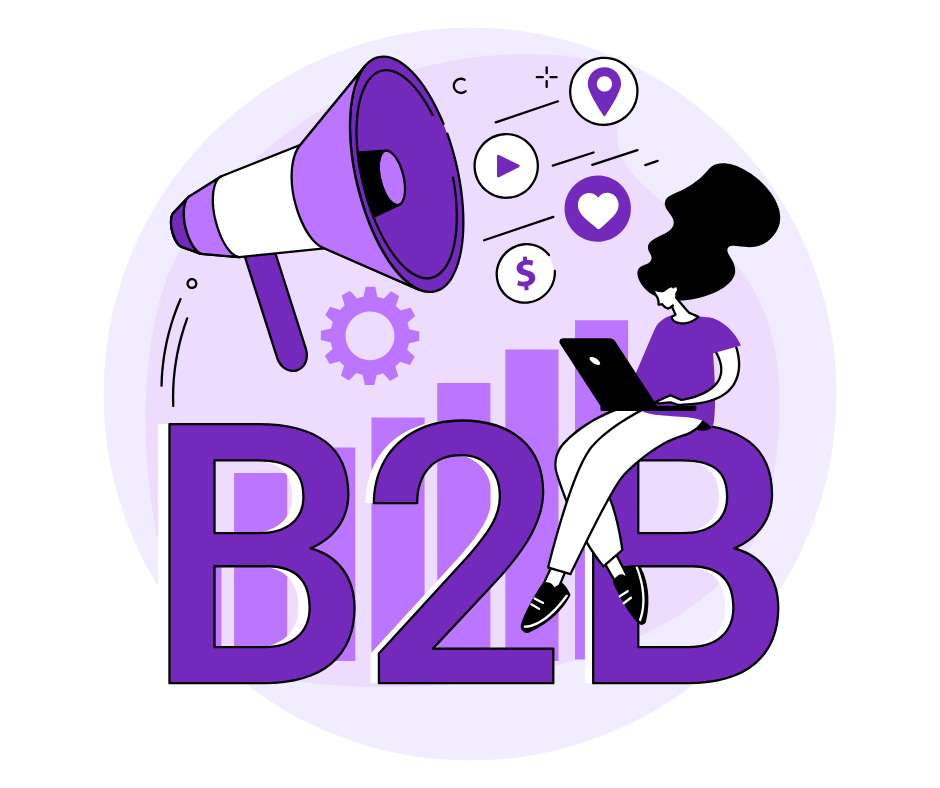CRM for B2B
In today’s rapidly changing business environment, CRM for B2B is becoming an indispensable tool for companies seeking to optimize their sales processes and manage customer relationships. In the coming years, effective contact management and sales process automation will be key to achieving a competitive advantage.
Which CRM for B2B?
B2B companies need a CRM that streamlines manage customer relationships, the sales process and after-sales service. Key features include lead management, automatic assignment of contacts to salespeople, monitoring of the sales funnel and integration with financial tools to handle quotes, invoices and payments. Also important are automation of follow-ups, customer segmentation, and sales performance reporting. A CRM for B2B should also offer AI tools to support VOIP business processes.
- Use AI in everyday tasks
- Enable automation in repetitive processes
- Save time on data analysis and reporting
AI supports business processes
Use AI to support your company’s processes. Sales, customer service and more!



Automations in CRM
How can CRM help B2B relationships?
CRM in B2B relationships helps Manage the entire sales cycle, from initial contact to after-sales service. It enables collect and analyze customer data, automatic assignment of leads to salespeople and tracking of interactions with contractors. By automating follow-ups and reminders of important deadlines, CRM improves communication and increases the chances of closing sales. Also key are Integrations with the most popular services for business.

Key integrations in B2B
We continue to develop SalesWizard integrations with the most popular IT services that support B2B companies.











Key problems in B2B that CRM solves
B2B contact management
In the B2B segment, contact management is much more complex than in B2C relationships, as it involves multiple contacts within a single company, various decision-making levels and complex corporate structures.
Solution:
- CRM solves this problem by integrating with CSO databases, automatically downloading company data, and creating links between the company and decision-makers and assigning positions to people who are decision-makers or involved in ongoing cooperation between companies. CRM allows you to assign multiple contacts to one organization, track business relationships and manage the sales process at the level of the entire company, not just a single representative. This gives salespeople a complete picture of a customer's structure, making it easier to personalize offers and conduct negotiations more effectively.
Process and sales funnel management
In the B2B segment, companies often run many parallel processes – from sales, to after-sales support, to complaints or contract renegotiations. The lack of a central system makes it difficult to track progress and coordinate teams’ activities.
Solution:
- CRM solves this problem by segmenting activities into process lines and sales funnels, assigning relevant topic threads, decision makers, communication history, tasks, actions and automations. This keeps every customer interaction organized and gives teams a complete view of the current status of conversations, making it easier to manage the relationship and speed up deal finalization.
Repetitive processes and tasks
In the B2B segment, many processes, such as contract generation, follow-ups, reminders or task management, are repetitive and time-consuming. Handling these activities manually increases the risk of errors and delays, and the lack of automation slows down the sales process.
Solution:
- The CRM solves this problem by automating key tasks, such as automatically creating and sending contracts, reminders for overdue follow-ups and automating the quoting process. The system monitors deadlines, sends notifications, and enables tracking of progress, allowing for more efficient process management and time savings for sales and customer service teams.
Innovation in the company
In B2B companies that do not use CRM and innovation, management of sales and customer service processes is chaotic and inefficient. Customer data is scattered in emails, spreadsheets or salespeople’s notes, making it difficult to access the history of cooperation and make accurate decisions. Sales processes are implemented manually, which increases response times to inquiries, leads to delays in follow-ups and increases the risk of lost leads. The lack of automation means that contracts, offers and reports must be prepared manually, which takes up valuable team time. Without advanced analytics and reporting, the company operates intuitively, without having a complete picture of the effectiveness of sales activities. As a result, the organization misses out on potential sales opportunities, incurs higher operating costs and has limited control over business performance.
Solution:
- CRM with AI automates sales forecasting, funnel analysis, lead scoring and personalization of communications. In addition, AI supports call and email analysis, generates intelligent recommendations and automatically detects potential problems in sales processes. As a result, companies can make faster decisions, increase the efficiency of operations and better use data to optimize business strategy.
Sales performance analysis and reporting
In the B2B segment, sales performance analysis and reporting are key challenges because sales processes are long, multi-step and involve multiple decision makers. Traditional reporting methods often do not capture the full picture of the sales funnel or the effectiveness of salespeople’s activities.
Solution:
- CRM solves this problem by automatically collecting data at each stage of the sales process, generating detailed reports and analysis. The system allows monitoring the effectiveness of salespeople, forecasting results and identifying sales bottlenecks. This allows companies to optimize their strategies, improve the efficiency of their teams and make better data-driven business decisions.
SalesWizard CRM modules recommended for B2B.
CRM for B2B is a series of processes in one system. Sales, ongoing service, contracts, billing, complaints. Learn about the key modules relevant to the B2B segment. Learn about all of SalesWizard’s features in the CRM functionalities section.

New leads and notifications in CRM
Requests from potential B2B customers from sites such as LinkedIn, Facebook, custom HTML pages automatically fall into the CRM system and are automated.
Online bidding in B2B
A standardized online quoting process allows for the creation of personalized and professional offers for the B2B segment.
VOIP telephony and in-house call centers
B2B companies perform prospecting activities aimed at sales. Use the VOIP telephony integration module to record calls and perform analytics with AI.
B2B process automation
Automation of repetitive activities in the B2B segment does not only apply to the sales process, but also to other activities, such as day-to-day operations, complaints, assemblies, servicing, contract generation or payment control.
Artificial intelligence from OpenAI to meet B2B needs
Use the power of artificial intelligence to handle customers and inquiries, analyze processes with customers.
Handling contracts and documents
Create contracts, minutes, addenda and other types of documents, sign them faster using an electronic signature.
CRM implementation for B2B.
Why SalesWizard CRM?
Implementing CRM in B2B is a multi-stage challenge!
Implementing a CRM system in a B2B company requires not only choosing the right tool, but also process customization, integration with other systems and team involvement.
- Key CRM modules for B2B
- Configuration and automation of the sales funnel
- Preparation of bidding templates and bidding process
- Using AI for analytics and customer communication
- Employee training and post-implementation analysis
B2B needs analysis
We will discuss your company’s needs in terms of sales process, sales funnel automation and B2B customer relationship optimization.
Sales process automation
We will automate key stages of B2B sales, including lead handling, quoting, service processes and contract finalization.
Building processes in B2B
We will tailor CRM processes to the specifics of your industry, optimizing sales paths and enabling effective performance monitoring.
AI chatbots for B2B
We will implement intelligent AI chatbots to support your sales team, automating the handling of the most common customer inquiries and streamlining sales processes.
We are still creating new functionalities!
If you haven’t found the functionality you need for your organization, see our Road Map for Application Development.
- Customized implementation of SalesWizard
- Possibility to commission unique modifications
- Full support in implementation

CRM for B2B - learn more
B2B customer relationship management requires advanced tools to improve the sales process, communication and post-sales service. In this section you will find answers to the most frequently asked questions about using CRM in B2B business.
What are the stages of CRM implementation in the B2B segment?
Implementing a CRM system in the B2B segment is a multi-stage process that requires careful planning and the involvement of the entire sales team. The first step is to analyze the company’s needs and determine the objectives to be met by the new system. This is followed by the selection of the appropriate CRM software that best suits the company’s business. The next step is to integrate the system with existing tools and train the sales team to ensure a smooth transition to the new work model. A key part of the implementation is also the continuous monitoring and adaptation of the system to changing market needs.
What roles do automation and integration play in modern CRM systems?
Automation and integration play a key role in modern CRM systems, enabling the optimization of sales processes and increasing the efficiency of marketing activities. Automation reduces time spent on routine tasks such as generating reports or managing leads, allowing salespeople to focus on building relationships with customers. Integration with other business tools, such as marketing platforms or ERP systems, enables better management of customer data and adaptation of operating strategies to changing market needs.
What innovations are being introduced by the latest CRM platforms?
The latest CRM platforms are introducing a number of innovations that are revolutionizing the way customer relationships and sales processes are managed. Modern CRM systems offer advanced analytical features that enable precise analysis of customer data and forecasting of market trends. In addition, there is an increasing emphasis on automation and integration with other business tools, allowing for even better contact management and increased efficiency of sales teams.
What mistakes to avoid when implementing CRM in B2B?
When implementing CRM in B2B companies, it is important to avoid common mistakes, such as a lack of clearly defined goals, insufficient management commitment or ignoring the needs of end users. It is also crucial to ensure proper integration with existing systems and to regularly monitor and adapt the system to changing market needs. Avoiding these mistakes allows the system to be implemented smoothly and maximize its potential in customer relationship management.
How can the sales team prepare for CRM?
Preparing the sales team to work with CRM is crucial to the success of the implementation. It is important that the team is properly trained in the use of the new system and understands the benefits of using CRM in their daily work. Regular training and technical support can help overcome initial difficulties and increase the team’s commitment to using the new tool. In addition, it is worth encouraging the sharing of experiences and best practices within the team, which promotes better adoption of new skills.
What problems can occur when implementing a CRM system in B2B?
Implementing a CRM system in B2B companies can encounter various challenges, such as resistance from the sales team, problems integrating with existing tools, or lack of adequate training. Choosing the right CRM software to best suit the company’s business is also a key challenge. To avoid these problems, it is important to plan the implementation process carefully and involve all stakeholders in the change process.
How does CRM help personalize customer interactions in the B2B segment?
CRM for B2B supports personalization of customer interactions by collecting and analyzing data on customer preferences and behavior. This enables salespeople to tailor communications and offers to meet individual customer needs, which increases customer engagement and loyalty. The CRM system also enables the tracking of interaction histories to better understand customer expectations and build long-term relationships based on trust.
How does a CRM system affect the automation of B2B sales processes?
The CRM system significantly affects the automation of sales processes, which allows you to optimize sales activities and increase the efficiency of your sales team. Automating tasks such as generating reports, tracking contacts and working with leads allows salespeople to focus on building relationships with customers and finalizing deals. Automation also allows better management of customer data and quick response to changing market needs.